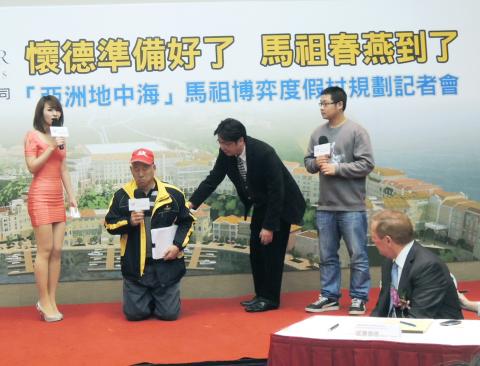An international developer bidding to build a casino resort on Matsu yesterday said it has budgeted US$2.5 billion to construct supporting infrastructure.
This will remove the biggest obstacle facing Matsu’s development: a lack of transportation infrastructure, Weidner Resorts chairman and CEO William Weidner said.
The money would be used mainly to upgrade Beigan Airport so that it can handle larger aircraft such as Airbus SAS’ A320s and Boeing Co’s 747s, Weidner said.

Photo: Tsai Wei-chi, Taipei Times
A bridge connecting the Matsu chain’s Beigan and Nangan islands, a ferry harbor and a yacht terminal would also be built, he said.
“[The project] will develop Matsu’s infrastructure and help connect it to the rest of the world,” Weidner said.
He said that the US$2.5 billion, which is part of the US$8 billion in funds for the entire project, came from Bank of America, Deutsche Bank, JPMorgan and Credit Suisse.
Weidner said the resort could generate 70,000 job opportunities.
Matsu County residents approved a referendum in July last year allowing casinos to be built on the island chain.
However, such projects cannot proceed until a bill governing the operation of casinos is passed by the legislature.
The Cabinet is currently working on drafting legislation toward that end.

Macronix International Co (旺宏), the world’s biggest NOR flash memory supplier, yesterday said it would spend NT$22 billion (US$699.1 million) on capacity expansion this year to increase its production of mid-to-low-density memory chips as the world’s major memorychip suppliers are phasing out the market. The company said its planned capital expenditures are about 11 times higher than the NT$1.8 billion it spent on new facilities and equipment last year. A majority of this year’s outlay would be allocated to step up capacity of multi-level cell (MLC) NAND flash memory chips, which are used in embedded multimedia cards (eMMC), a managed

CULPRITS: Factors that affected the slip included falling global crude oil prices, wait-and-see consumer attitudes due to US tariffs and a different Lunar New Year holiday schedule Taiwan’s retail sales ended a nine-year growth streak last year, slipping 0.2 percent from a year earlier as uncertainty over US tariff policies affected demand for durable goods, data released on Friday by the Ministry of Economic Affairs showed. Last year’s retail sales totaled NT$4.84 trillion (US$153.27 billion), down about NT$9.5 billion, or 0.2 percent, from 2024. Despite the decline, the figure was still the second-highest annual sales total on record. Ministry statistics department deputy head Chen Yu-fang (陳玉芳) said sales of cars, motorcycles and related products, which accounted for 17.4 percent of total retail rales last year, fell NT$68.1 billion, or

In the wake of strong global demand for AI applications, Taiwan’s export-oriented economy accelerated with the composite index of economic indicators flashing the first “red” light in December for one year, indicating the economy is in booming mode, the National Development Council (NDC) said yesterday. Moreover, the index of leading indicators, which gauges the potential state of the economy over the next six months, also moved higher in December amid growing optimism over the outlook, the NDC said. In December, the index of economic indicators rose one point from a month earlier to 38, at the lower end of the “red” light.

MediaTek Inc (聯發科) shares yesterday notched their best two-day rally on record, as investors flock to the Taiwanese chip designer on excitement over its tie-up with Google. The Taipei-listed stock jumped 8.59 percent, capping a two-session surge of 19 percent and closing at a fresh all-time high of NT$1,770. That extended a two-month rally on growing awareness of MediaTek’s work on Google’s tensor processing units (TPUs), which are chips used in artificial intelligence (AI) applications. It also highlights how fund managers faced with single-stock limits on their holding of market titan Taiwan Semiconductor Manufacturing Co (TSMC, 台積電) are diversifying into other AI-related firms.